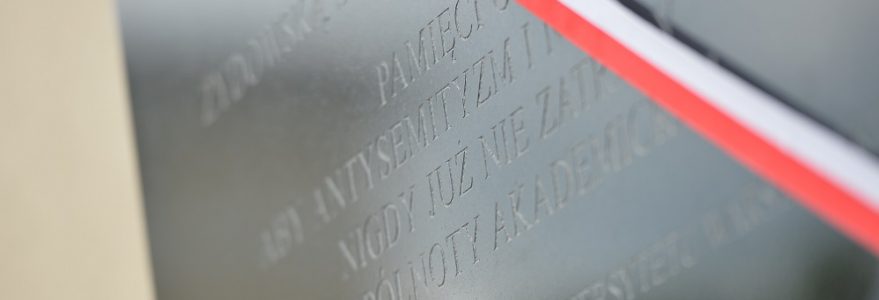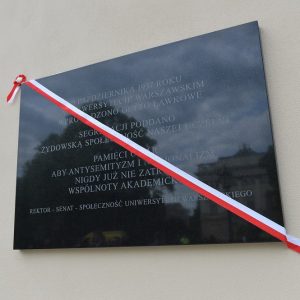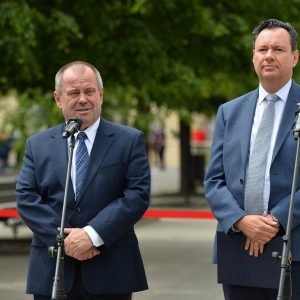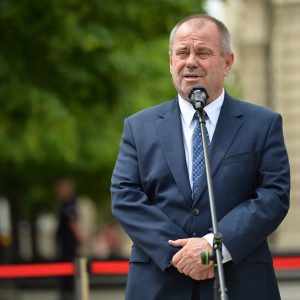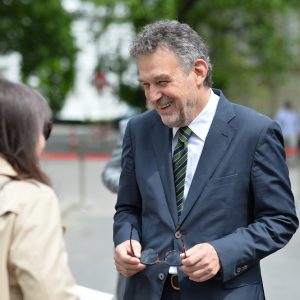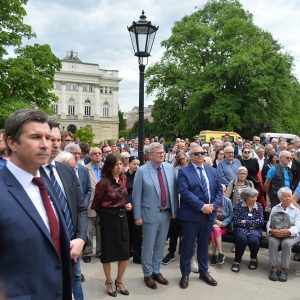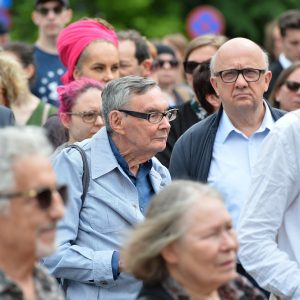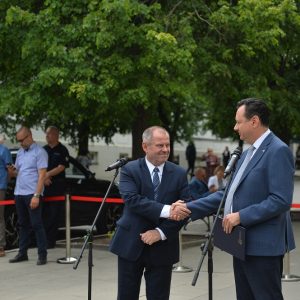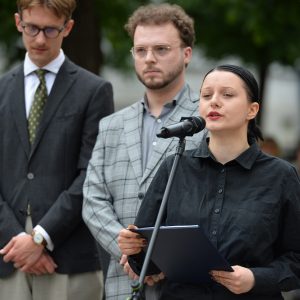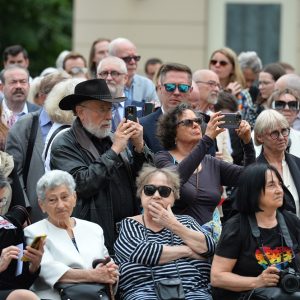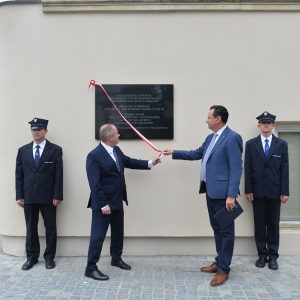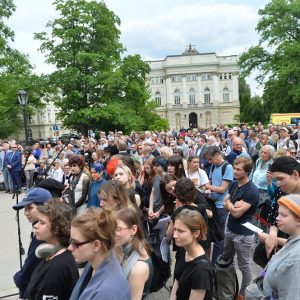On 22nd May the plaque of the victims of the ghetto benches was officially unveiled on the UW campus at Krakowskie Przedmiescie. The ceremony was attended by representatives of the authorities, students and academics of the University of Warsaw as well as Israeli Ambassador to Poland Yacov Livne.
In October it will have been 86 years since the authorities of the Warsaw universities, with the support of the universities’ senates, implemented the ordinance on seat designation, known as ‘ghetto benches’ segregation. Students of Jewish origin were required to sit on designated benches during lectures and classes. The 1937/1938 was the first academic year to expose officially approved antisemitism at Polish universities.
To show our remembrance of this difficult part of the academic history, the UW established a special group for the plaque to commemorate the victims of the ghetto benches. Dr Ryszard Schnepf, a historian, diplomat and lecturer of the Institute of the Americas and Europe, University of Warsaw, became a coordinator of the group.
The official ceremony of unveiling the plaque to commemorate the victims of the ghetto benches was held on Monday 22nd May at 12 am, near the Main Gate of the UW campus at Krakowskie Przedmiescie 26/28.
To remember
“I perceive it a special privilege, yet, on the other hand, a great joy to have here the Israeli Ambassador to Poland to unveil the plaque, which symbolises our disapproval of the ghetto benches and different treatment of academics as well as separate groups within the whole society. The University’s aim is to reach the truth. The essential principles followed by the academic community put particular emphasis on tolerance and respect to diversities. The University of Warsaw has been following these ideas throughout the major part of its history. Nevertheless, there are such points of the history as the year of 1937 when our students were forced into separate groups. This plaque has been created as a result of an incredibly forceful support from the entire University community in order to remember the past events and never let them happen again. We form a diverse community with mutual respect to one another. This makes the University of Warsaw a widely recognised higher education institution both in Poland and abroad. I am being proud of our academic community and their support,” Prof. Alojzy Z. Nowak, the UW Rector, said while opening the ceremony.
The plaque, which commemorates the victims of the ghetto benches, has been officially unveiled by Prof. Alojzy Z. Nowak, the UW Rector, and Yacov Livne, the Ambassador of Israel to the Republic of Poland.
“I am honoured and happy to meet here today so many people gathered in the centre of Warsaw to commemorate the dark pages of the history of our both nations. It is vital to remember the real history, together with its virtues and vices. Unless we remember the past, we will not be able to apprehend the present and shape the better future,” Israeli Ambassador Yacov Livne emphasised the importance of the event.
“I would like to express my gratitude to hundreds of people who advocated our initiative. Thanks to the cooperation and solidarity we managed to reach this moment here. We would like to say ‘thank you’ to the Rector and the Chancellor of the University of Warsaw, as well as each member of the University Senate. However, we do not intend to close the past just by establishing this plaque. The University debate has merely began,” Antonina Dukowicz, the representative of the UW students, remarked.
The event was accompanied with a musical performance by the young students of Jacek Kuroń Multicultural High School of Humanities in Warsaw.
Dear Sirs/Madams,
I hold a deep conviction that our academic community should be guided by principles of equality, respect, and solidarity. These principles form the foundation of our university community, enabling scientific development and serving as the bedrock of academic freedom. We must embody these values ourselves, driven by our own convictions, in a completely natural manner. Even the most comprehensive legal regulations cannot guarantee the observance of principles of equality and solidarity if we do not share and embrace them.
During the interwar period, when Poland regained its independence and provided the academic community with the opportunity to pursue their ambitions and scientific endeavors after a long period of subjugation, not all circles understood the necessity of adhering to the principles of solidarity. In the politically tense atmosphere of the late 1930s, the Lviv University of Technology, Warsaw University of Technology, Warsaw School of Economics, Warsaw University of Life Sciences, University of Lviv, University of Vilnius, and also the University of Warsaw implemented discriminatory regulations aimed at dividing the academic community. On October 5, 1937, the so-called “seating ghetto” was established at our university. Jewish students were not allowed to choose seats independently during lectures and classes, and their academic records were stamped with the euphemistic inscription “seat in odd-numbered seats.”
It is important to recall the stance of those who disagreed with such direction and refused to conform to such regulations. Some Jewish students preferred to stand during classes rather than occupy the designated seats. Similarly, some Polish students refrained from taking seats during lectures to show solidarity with the persecuted Jewish minority and listened to lectures while standing. Such attitudes were and continue to be worthy of admiration and emulation.
As we unveil the plaque today commemorating the victims of anti-Semitism, let us remember that our active stance is the most effective weapon against discrimination. In aspiring to the unhindered development of academic life and fostering healthy relationships within our academic community, we should support the principles of equality, respect, and solidarity through our own example.
Prof. Alojzy Z. Nowak
Rector of the University of Warsaw



